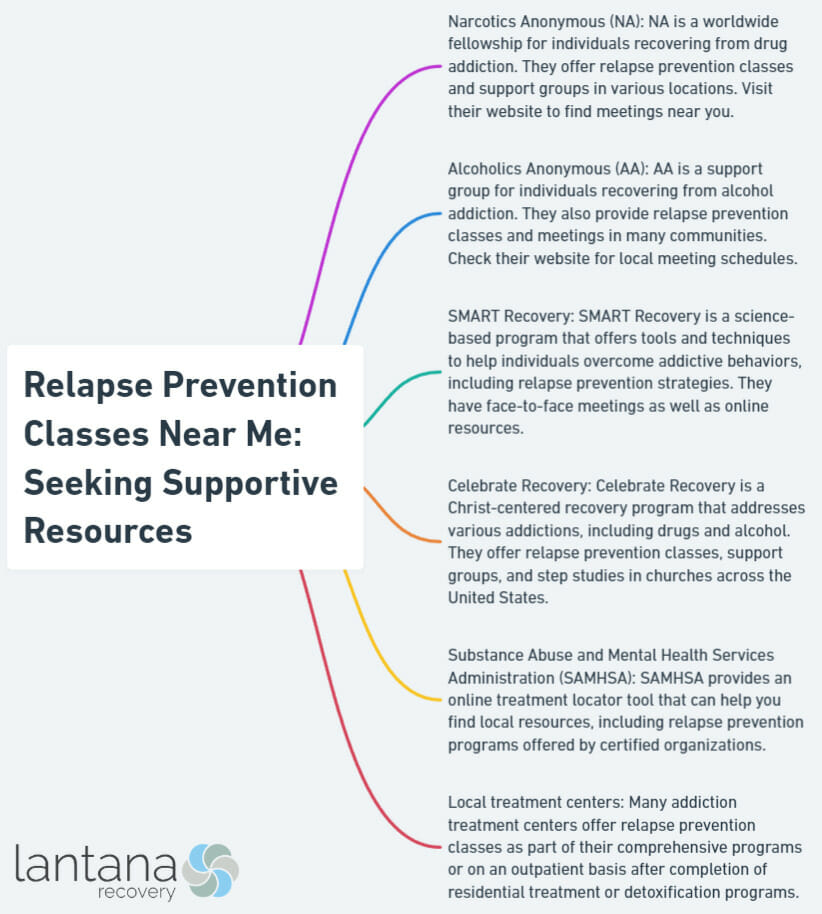Relapse prevention is a crucial aspect of addiction recovery, and seeking supportive resources is essential to maintain sobriety in the long term. Relapse prevention classes offer valuable tools, strategies, and support to help individuals navigate the challenges of recovery and avoid slipping back into addictive behaviors. These classes play a significant role in providing guidance and equipping individuals with the skills necessary to prevent relapse effectively.
Relapse prevention classes are essential for several reasons. They provide education and awareness about the relapse process, triggers, and warning signs. Understanding these concepts allows individuals to recognize potential setbacks and take proactive steps to prevent relapse. These classes also focus on building coping skills, developing healthy habits, and fostering resilience, all of which are vital for sustaining recovery.
When looking for relapse prevention classes, there are a few key factors to consider. Firstly, location and accessibility are important to ensure regular attendance and convenience. Qualified instructors with experience in addiction recovery are crucial, as they can provide expert guidance and support. A comprehensive curriculum covering various relapse prevention strategies and techniques is also vital for a well-rounded learning experience. Lastly, a supportive and non-judgmental atmosphere helps promote open communication and peer support.
Finding relapse prevention classes near you can be done through various means. Online searches can provide information about local classes, support groups, treatment centers like Lantana, and clinics that offer relapse prevention programs. Local support groups, such as 12-step programs like Alcoholics Anonymous or Narcotics Anonymous, may also provide resources and recommendations. Treatment centers and clinics that specialize in addiction recovery often offer relapse prevention classes as part of their comprehensive treatment programs.
Participating in relapse prevention classes offers numerous benefits for individuals in recovery. Firstly, these classes help strengthen coping skills, providing healthier ways to manage stress, cravings, and other triggers. Peer support and accountability within these classes create a sense of community, fostering encouragement and motivation throughout the recovery journey. Relapse prevention classes aid in identifying triggers and warning signs, empowering individuals to take proactive measures when faced with potential relapse situations.

Importance of Seeking Supportive Resources
After learning about what relapse is and understanding the return to substance use, the importance of seeking supportive resources for relapse prevention cannot be overstated. It is crucial to recognize and utilize the importance of seeking supportive resources in order to enhance the chances of long-term success in the journey toward recovery and relapse prevention. These resources play a vital role for several reasons:
- Accountability: Supportive resources provide accountability, ensuring that individuals stay on track with their goals and commitments.
- Guidance: Supportive resources offer expertise in navigating the challenges and obstacles that arise during relapse prevention.
- Encouragement: Supportive resources boost confidence and belief in maintaining sobriety, providing the encouragement needed to stay on the right path.
- Knowledge: Supportive resources provide valuable information about effective relapse prevention strategies, coping mechanisms, and making healthy lifestyle choices.
- Community: Supportive resources connect individuals with others who have similar experiences, creating a sense of belonging and companionship that can be crucial in maintaining motivation.
- Tools and techniques: Supportive resources equip individuals with practical tools and techniques for managing cravings, triggers, and stressors, empowering them to effectively deal with these challenges.
- Relapse prevention: By seeking support, individuals increase their chances of preventing relapse, as they gain access to necessary resources and strategies for maintaining sobriety.

Why are Relapse Prevention Classes Important?
Relapse prevention classes are crucial in addiction recovery. They provide individuals with tools and support to maintain sobriety and prevent relapse. Here are some reasons why these classes are important:
-
Education: Relapse prevention classes educate individuals about addiction and relapse triggers. By understanding these factors, individuals can recognize and avoid situations that may jeopardize their recovery.
-
Coping skills: These classes teach practical coping skills to manage stress, cravings, and negative emotions without using substances. They provide strategies to effectively deal with challenges and setbacks.
-
Accountability: Relapse prevention classes include group therapy sessions where individuals connect with others in recovery. By sharing experiences and offering support, peers hold each other accountable and provide encouragement.
-
Identifying warning signs: These classes emphasize the importance of recognizing early warning signs of relapse. By learning to identify triggers and negative behaviors, individuals can prevent a relapse before it occurs.
-
Continued growth: Recovery is an ongoing process, and relapse prevention classes offer opportunities for personal growth and development. Through regular attendance and participation, individuals cultivate a strong foundation for long-lasting sobriety.
True Story: Sarah, a recovering addict, completed a residential treatment program and was determined to stay sober. However, she struggled to cope with everyday challenges and faced constant temptations to use drugs. Realizing the importance of additional support, she joined a relapse prevention class in her community.
Through the classes, Sarah gained valuable knowledge about addiction and relapse triggers. She learned healthy coping mechanisms and received support from others who understood her struggles. The class helped her recognize warning signs and provided a safe space to discuss her concerns.
Sarah’s participation in relapse prevention classes gave her the tools and resilience to navigate difficult times. She successfully avoided relapse, rebuilt her life, and became an active member of her recovery community. Relapse prevention classes played a crucial role in Sarah’s journey to long-term sobriety, providing her with the necessary support and guidance to maintain a healthy and fulfilling life free from addiction. You can learn all about what to do when you relapse, coping strategies, and seek help too.

What to Look for in Relapse Prevention Classes
When it comes to finding the right relapse prevention class, what should you be looking for? Let’s explore the key factors that can make a difference in your recovery journey. From convenient locations and qualified instructors to a comprehensive curriculum and a supportive atmosphere, we’ll uncover the essential elements that will help you thrive on your path to sobriety. Stay tuned as we dive into each sub-section and discover the crucial aspects that make relapse prevention classes truly effective.
1. Location and Accessibility
When it comes to relapse prevention classes, location, and accessibility are crucial factors to evaluate. The convenience of the location can greatly impact your ability to attend consistently and make the most out of the program.
Below is a summary of the key factors to consider:
- Proximity to your home or workplace: It is important to choose classes that are conveniently located near your home or workplace. This will reduce travel time and make it easier for you to fit the classes into your schedule.
- Access to public transportation: If you rely on public transportation, make sure that the classes are easily accessible by bus, train, or other modes of public transit. This will eliminate any transportation barriers that may hinder your attendance.
- Availability of parking: Check if there is ample parking space near the class location. This is especially important if you prefer to drive, as it will help you avoid any potential parking hassles or delays.
- Online options: Consider if there are online relapse prevention classes available. These classes provide flexibility and can be conveniently accessed from the comfort of your own home.
By carefully considering the location and accessibility of relapse prevention classes, you can ensure convenient and feasible attendance, which will increase your chances of successfully completing the program.
2. Qualified Instructors
Qualified Instructors are essential when searching for relapse prevention classes. It is important to consider the qualifications of the instructors to ensure they have the necessary expertise and experience in addiction and relapse prevention. They should understand the challenges faced by individuals in recovery and be knowledgeable in evidence-based strategies to prevent relapse.
- Credentials are also crucial when selecting instructors for these classes. Look for instructors with professional certifications or degrees in addiction counseling or related fields. These credentials indicate that the instructors have received specialized training and have the necessary competency in addiction treatment.
- Continuing education is another important factor to consider. Instructors who are committed to professional development will engage in continuing education. This could include attending workshops, conferences, and seminars to stay updated on the latest research and advancements in addiction treatment.
- Effective communication skills are vital in relapse prevention classes. Instructors must be able to convey information clearly, engage participants in discussions, and create a supportive learning environment.
- Instructors who demonstrate empathy and understanding create a safe and non-judgmental space for participants to share their experiences. This fosters trust and encourages active participation.
By considering these factors, individuals can enroll in relapse prevention classes led by qualified instructors who can provide them with the necessary support and guidance in their recovery journey.
3. Comprehensive Curriculum
When seeking relapse prevention classes, it is important to find a curriculum that is comprehensive. A comprehensive curriculum covers a wide range of relevant topics related to relapse prevention such as understanding addiction, identifying triggers, developing coping strategies, building healthy relationships, and managing stress. It should be based on evidence-based approaches and best practices in addiction treatment, incorporating research and clinical experience to offer effective strategies and interventions. Studies have shown that “the integration of relapse prevention techniques into a psychotherapeutic approach aims to enhance effectiveness in the treatment of cocaine abusers” (Relapse Prevention Strategies for the Treatment of Cocaine Abuse, Carroll et al., 2009.)
Additionally, a comprehensive curriculum should provide opportunities for the practical application of the concepts and skills learned, allowing participants to practice coping skills in a supportive environment through role-playing exercises, case studies, and real-life scenarios.
Moreover, it should offer ongoing support beyond the classroom setting, with access to support groups, individual counseling, and additional resources to help individuals maintain their recovery and prevent relapse. Progress monitoring is also essential in a comprehensive curriculum, with regular assessments, feedback sessions, and individualized goal-setting to track participant progress and make necessary adjustments. By considering these factors, individuals can ensure they are enrolling in relapse prevention classes that offer a comprehensive curriculum designed to support their recovery journey.
4. Supportive Atmosphere
When seeking relapse prevention classes, it is crucial to consider the importance of a supportive atmosphere. The presence of a supportive atmosphere greatly enhances the effectiveness of the classes and contributes significantly to individuals’ overall well-being and recovery journey.
- One key aspect of a supportive atmosphere is creating an encouraging environment. An encouraging environment creates a sense of belonging and support, which fosters an atmosphere where individuals feel comfortable opening up, sharing their experiences, and seeking guidance from others on a similar path.
- Instructors also play a vital role in creating a supportive atmosphere. Compassionate and empathetic instructors are crucial in this regard. They should actively listen to participants’ concerns, exhibit compassion, and empathy, and provide guidance and encouragement throughout the classes. This helps individuals feel understood and supported throughout their recovery journey.
- Another important factor in creating a supportive atmosphere is positive group dynamics. Positive group dynamics cultivate an environment of support and encouragement. Creating opportunities for group discussion, sharing stories, and providing encouragement and support helps boost motivation and creates a sense of camaraderie among the participants.
- Relapse prevention classes should also provide a non-judgmental space for individuals to express their thoughts and emotions freely. This non-judgmental space allows for open and honest communication, fostering a supportive atmosphere where individuals can feel safe without fear of criticism or judgment.
Additionally, a supportive atmosphere should extend beyond class sessions. It is essential to provide continuous support to individuals throughout their recovery journey. This can be done by offering additional resources such as support groups or counseling services. By providing ongoing support and guidance, individuals can feel supported and empowered throughout their recovery process.

Finding Relapse Prevention Classes Near Me
Looking for relapse prevention classes near you? In this section, we’ll explore different avenues to find the support you need. From online searches to local support groups, and treatment centers and clinics, we’ve got you covered. Discover the various options available and learn how they can help you in your journey toward overcoming addiction. So let’s dive in and find the resources that will set you on the path to lasting recovery.
1. Online Search
When conducting an online search, you can find the resources you need for relapse prevention classes. Here are some points to consider when searching for relapse prevention classes online:
1. Select specific keywords: Use keywords like “relapse prevention classes near me” or “addiction recovery programs in my area” when searching. This will help you find search results tailored to your location and needs.
2. Refine your search: Narrow down your search results by adding additional filters like preferred location, type of addiction, or specific requirements. This will help you find classes that meet your specific needs.
3. Read reviews and testimonials: Look for feedback from individuals who have attended the classes you are considering. This will give you insight into the program’s effectiveness and quality.
4. Check for accreditation: Look for relapse prevention classes that are accredited or certified by reputable organizations. Accreditation ensures that the program meets standards of quality and effectiveness.
5. Compare costs and availability: Consider the cost and availability of the classes you find. Look for programs that fit your budget and have scheduling options that align with your availability.
Conducting an online search can provide valuable information and resources for finding relapse prevention classes. Remember to consider your specific needs and preferences when making your decision.
2. Local Support Groups
Local support groups are a valuable resource for individuals seeking relapse prevention. These groups provide a supportive environment where people can share experiences, receive encouragement, and learn coping strategies for recovery. Here are important factors to consider when looking for local support groups:
- Accessibility: Choose a conveniently located and easily accessible Support Group to ensure regular attendance.
- Qualified facilitators: Look for groups led by experienced facilitators who can provide guidance and support.
- Comprehensive approach: Consider Support Groups that cover various aspects of relapse prevention, including coping skills, triggers, and warning signs.
- Safe and supportive atmosphere: Ensure that the group creates a non-judgmental environment where individuals can comfortably share struggles and seek assistance.
To find local support groups, you can use these methods:
- Online search: Utilize online platforms and search engines to find groups in your area. Check addiction treatment center websites or national organizations for relevant listings.
- Local resources: Reach out to community centers, hospitals, or mental health clinics to inquire about Local Support Groups.
- Treatment centers and clinics: Contact addiction treatment centers or clinics near you as they often offer support groups.
Joining a Local Support Group brings benefits such as:
- Peer support and accountability: Interacting with others who have similar experiences fosters a sense of belonging and provides accountability for sobriety.
- Strengthened coping skills: Participants can learn and practice effective coping strategies from others in similar situations.
- Identifying triggers and warning signs: Group discussions help individuals gain insights into personal triggers and warning signs, allowing them to better manage these challenges.
3. Treatment Centers and Clinics
When seeking relapse prevention classes, treatment centers, and clinics provide valuable resources and support. Treatment centers and clinics are essential for individuals in need of relapse prevention. Important factors to consider when choosing a treatment center or clinic include:
1. Qualified staff: It is crucial to choose a center or clinic with instructors who specialize in relapse prevention. These instructors should have the necessary certifications and experience in addiction recovery.
2. Comprehensive approach: Look for treatment centers and clinics that offer a curriculum comprising educational materials, therapeutic sessions, and practical skills training. This comprehensive approach helps individuals effectively prevent relapse.
3. Individualized care: Treatment centers and clinics should provide personalized treatment plans tailored to the unique needs of each individual. A one-size-fits-all approach is not effective in addiction and relapse prevention.
4. Supportive environment: Creating a safe and non-judgmental atmosphere is crucial for individuals in recovery. Treatment centers and clinics should cultivate an environment where individuals feel comfortable sharing their experiences and seeking support from peers and professionals at rehab centers like Lantana Recovery in Greenville.
5. Access and availability: When considering a treatment center or clinic, it is important to consider its location and accessibility. Choosing a facility that is conveniently located and easily accessible ensures regular attendance and participation in relapse prevention classes.
By considering these factors, individuals can find treatment centers and clinics that offer relapse prevention classes tailored to their needs. Seeking support from these resources can greatly enhance the recovery journey and help individuals maintain long-term sobriety.

Benefits of Relapse Prevention Classes
Relapse prevention classes offer a wealth of benefits that can greatly support individuals on their recovery journey. In this section, we’ll dive into the advantages of participating in these classes. From building stronger coping skills to receiving invaluable peer support and accountability, as well as identifying triggers and warning signs, we’ll explore how these classes provide the necessary tools and insights to maintain sobriety. So, let’s discover the positive impacts of engaging in relapse prevention classes and how they can enhance one’s recovery experience.
1. Strengthened Coping Skills
By attending relapse prevention classes, individuals can strengthen their coping skills, which are crucial for maintaining long-term sobriety. Here are some ways in which these classes help enhance coping skills:
- Learning Effective Strategies: In relapse prevention classes, individuals are taught practical techniques and strategies to effectively manage cravings, triggers, and stressors. These strategies, such as deep breathing exercises or mindfulness techniques, contribute to the development of healthier coping mechanisms. A study by Bowen, PhD et al., titled Mindfulness-Based Relapse Prevention for Substance Use Disorders focused on the initial randomized-controlled trial of Mindfulness-Based Relapse Prevention (MBRP) which demonstrated encouraging outcomes for individuals with substance use disorders after intensive treatment.
- Building Resilience: Relapse prevention classes focus on cultivating resilience, which involves the ability to bounce back from setbacks. By teaching individuals how to overcome challenges and maintain a positive mindset, these classes empower them to handle stressors and difficult situations more efficiently.
- Identifying Negative Thought Patterns: Relapse prevention programs often incorporate cognitive-behavioral therapy (CBT). This approach helps individuals recognize and challenge negative thought patterns and beliefs that may contribute to relapse. By reframing negative thinking, individuals can develop more constructive ways of coping.
- Developing Support Networks: Relapse prevention classes offer opportunities for individuals to connect with peers who share similar experiences. Sharing experiences and providing support fosters a sense of belonging and reduces feelings of isolation, ultimately enhancing coping skills.
- Practicing Self-Care: Relapse prevention classes emphasize the importance of self-care in recovery. Individuals learn to prioritize their physical and emotional well-being, including engaging in activities that promote relaxation, stress reduction, and overall self-fulfillment. Taking care of oneself is crucial for developing effective coping skills.
Attending relapse prevention classes can significantly strengthen an individual’s coping skills, equipping them with the tools and strategies necessary to maintain sobriety and successfully navigate the challenges of recovery.
2. Peer Support and Accountability
Peer support and accountability are crucial for relapse prevention. Connecting with others who have similar experiences can greatly enhance chances of long-term sobriety. Here are some reasons why peer support and accountability are essential:
1. Shared experiences: Interacting with peers who have faced similar challenges provides validation and understanding. It builds a network of support and insight from those who have successfully navigated recovery.
2. Encouragement and motivation: Peer support groups create a positive environment where individuals can motivate each other to stay on track with recovery goals. Sharing progress stories and celebrating milestones boosts morale and inspires during challenging times.
3. Accountability: Being accountable to peers helps individuals stay committed to recovery. Regular check-ins and progress updates promote responsibility and self-discipline.
4. Learning from relapses: Relapses can be part of the recovery journey. In a peer support group, individuals openly discuss relapses without fear of judgment. This allows for learning from each other’s experiences, identifying triggers, and developing strategies to prevent future relapses.
When seeking relapse prevention classes, prioritize programs that emphasize peer support and accountability. Look for classes that encourage group discussions, active participation, and a supportive atmosphere. Consider joining local support groups or seeking treatment centers that incorporate peer support. Having peers who understand and support your recovery journey can make a significant difference in long-term sobriety.
3. Identifying Triggers and Warning Signs
Identifying triggers and warning signs is vital in the effort to prevent relapse. Being able to recognize these cues is crucial for individuals to avoid relapse and maintain their sobriety. Here is a step-by-step guide on effectively identifying triggers and warning signs:
1. Reflect on past experiences: Take the time to think about the situations that led to previous relapses and the emotions, people, places, or events associated with them.
2. Be aware of your emotional states: Pay attention to your mood and emotional well-being. It is common for emotional distress, such as stress, anger, or sadness, to precede relapse.
3. Identify high-risk situations: Be able to recognize environments where substance use is prevalent or situations where you might be around people who enable or encourage substance use.
4. Recognize negative thought patterns: Become aware of negative thinking patterns or self-sabotaging thoughts that may lead to relapse.
5. Pay attention to physical cues: Notice any physical sensations or cravings that could indicate a potential relapse.
6. Develop coping strategies: Cultivate effective strategies to manage triggers and warning signs. Seek support from a therapist or support group, practice relaxation techniques, or engage in healthy activities. For instance, Teasdale er al., found that mindfulness meditation-based stress-reduction techniques can be as effective as cognitive therapy in preventing depressive relapse in the study How does cognitive therapy prevent depressive relapse and why should attentional control (mindfulness) training help?
7. Create a relapse prevention plan: Take the time to develop a personalized plan that directly addresses the triggers and warning signs you have identified. Outline specific steps to take and include alternative actions to substitute for substance use.
By following these steps and remaining vigilant, individuals can significantly enhance their ability to maintain sobriety and minimize the risk of relapse.
Frequently Asked Questions
1. What are relapse prevention classes and how can cognitive therapy help in maintaining recovery?
Relapse prevention classes are supportive resources aimed at helping individuals avoid a return to substance use after completing treatment. Cognitive therapy is an essential component of these classes and focuses on changing negative thinking patterns and developing healthy coping skills. It helps individuals address fear, redefine fun, and learn from setbacks, ultimately assisting in maintaining recovery.
2. Are there medication options available for relapse prevention?
Yes, there are medication options available for relapse prevention. Depending on the individual’s specific situation, healthcare providers may prescribe certain medications to assist in the prevention of relapse. It is important to consult with a healthcare professional to determine if medication is suitable and recommended.
3. Can I attend a 60-minute Victims Impact Panel session as part of the relapse prevention classes?
Yes, the relapse prevention classes offered include a free 60-minute Victims Impact Panel session. This session provides an opportunity for individuals to gain insight into the consequences and impact of their actions, promoting empathy and reinforcing the importance of maintaining recovery.
4. How can I find relapse prevention classes near me if I am enrolled in VA health care?
If you are enrolled in VA health care, you can access relapse prevention classes through the VA system. Reach out to your local VA medical center or contact the Substance Use Disorder (SUD) program for information and assistance in finding relapse prevention resources near you.
5. What are the stages of recovery, and how do they relate to relapse prevention?
The stages of recovery include the abstinence stage, growth stage, and repair stage. Each stage has its own risks of relapse, and recognizing these stages is crucial in relapse prevention. By understanding where they are in their recovery journey, individuals can implement appropriate strategies and support to maintain their progress.
6. Are there any resources available to prevent substance misuse and promote positive mental health?
Yes, there are various resources available for prevention efforts and for promoting positive mental health. The National Survey on Drug Use and Health (NSDUH) report provides crucial data for understanding substance use and mental illness. Additionally, the Substance Abuse and Mental Health Services Administration (SAMHSA) offers public messages, programs, and publications available through the SAMHSA Store. The Prevention Resources for Building Healthy Communities is a recommended resource for preventing substance misuse.









